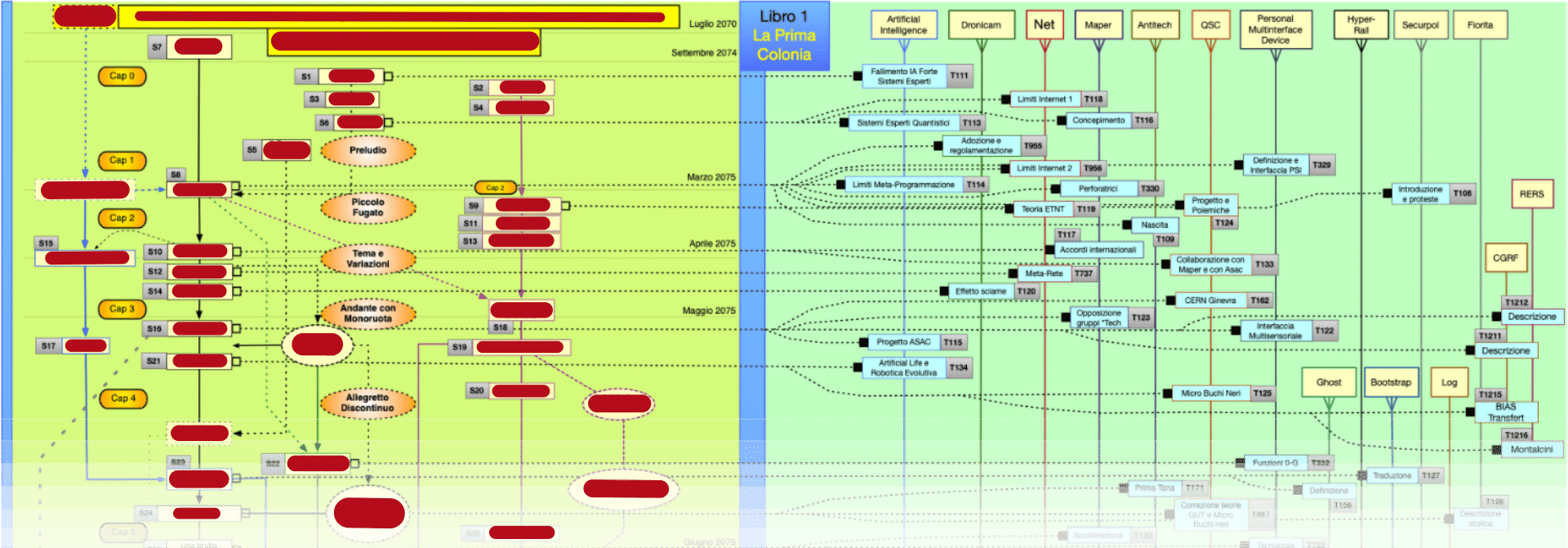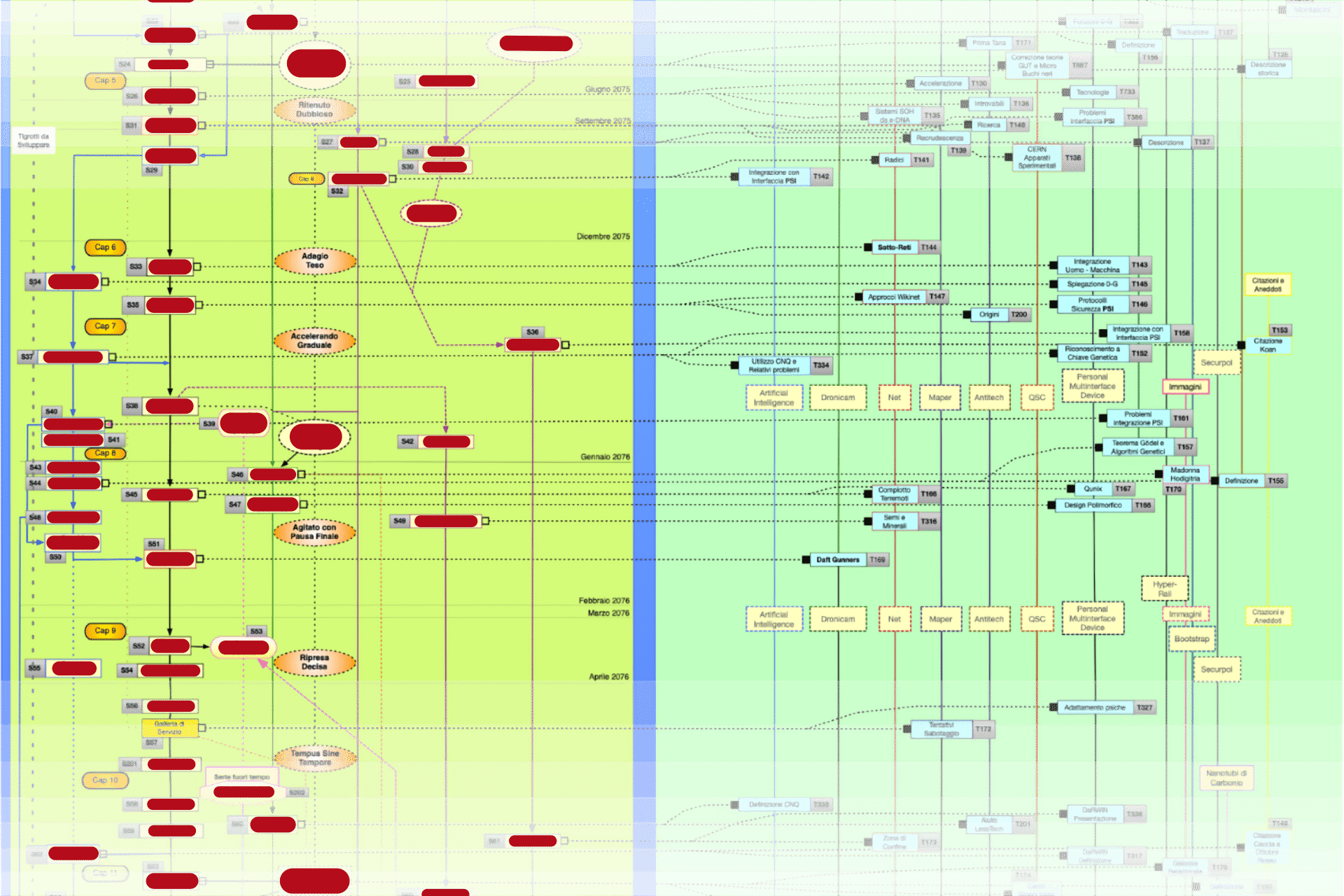…a “quantum superposition” of both?
Everyone has their own way of narrating, composing music, thinking. A dear friend wrote in a – nice – review that my writing style reminds me of my music. Whether I should consider it a compliment (of course it is intended) or a criticism is up to the reader – or the listener – to decide.
What is certain is that my writing is not linear, as someone else has critically pointed out. Just as my music is not purely melodic: if anything, it is more “stratiform”.
Instinctive writing: write in layers
Well, I like layers, which in music become polyphony, polyrhythm, polytonality; while in writing they can become entries from the internal wiki, glyphs, music, changes of perspective, sudden stylistic mutations, choral and densely intertwined sub-plots.
I can limit myself, try to control my instincts so as not to become too cryptic or distracting, but I cannot distort myself. It’s the way I love to represent reality: as complexity (which is not complication).
When I write or compose I work by “successive brush strokes” (yes Roberto Rizzardi, you hit the mark as the best Zen archer) and this way of proceeding causes problems. The first is that I never have a precise idea of where the story is going, until the whole plot (this time understood more as that which accompanies the warp, in a Robert Jordan metaphor) unravels in my mind. The characters act with their emotions and their logic: so I just have to follow them hoping that they will light the way. As happens with the events of the story, which at a certain point seem to happen independently of my will.
In short, “a great semantic jumble”, as I wrote elsewhere.
Schematic writing: the advent of OmniGraffle
Saga was and certainly remains fundamental to gradually, historically and with the correct connections, organize all the materials without getting lost or overwhelmed by anxiety, but all this would not be sufficient without a precise concept map.
I have been using concept maps since time immemorial without ever wondering who and when first defined and theorized them.From Wikipedia (!) I learn that it was Joseph D. Novak, learning theorist, starting from the 70s. And we will never be grateful enough to him.
My software choice fell on OmniGraffle, a program developed by the OmniGroup, an American software house specialized in productivity products first on the Next platform (the ancestor of the current Apple operating system) and then in the Mac / iOS environment. With OmniGraffle I built the diagram you can see on the side – if you use a computer or a tablet.
It is also shown in segments on this page, a little larger and more readable but with the descriptions of the hidden scenes: anticipating too much is bad, don’t you think?
Beati monoculi in terra cæcorum
Why didn’t I hide the item descriptions on the right side of the diagram? Because those are the voices of the internal Wikinet and they cannot suggest anything to you about the development of the story.
The map, in addition to keeping track of the development of the main plot and sub-plots, shows all the connections between the scenes and the related entries in the internal Wikinet (which I call “references”). To the left of each element is a number that identifies it within Saga, as a scene or as a reference.
The chapter titles, as you can see, are influenced by my musical training but also by a certain nerd or geek taste, depending on the meaning you give to these terms (there is no real agreement on the matter).
Finally, each element is also a link to the corresponding Web page, be it related to the scene or the internal Wikinet reference.
Blessed are the one-eyed in the land of the blind.
Instinctive or schematic writing: cui prodest?
Mine is certainly not intended to be an indication on how others should write and develop their stories. Nor a simple “look how nerdy or geeky I am”.
Rather, it is a long and verbose personal outburst, for which I hope you will forgive me: after many years of work in which I have racked my brains to combat on the one hand my age-old laziness, and on the other the complexity of creating a secondary world endowed with a certain coherence, making you aware of how I succeeded – at least, I hope I succeeded – is part of the sharing process, which is the author’s ultimate goal: to create something beautiful and engaging, to give something of oneself and receive the emotional and intellectual participation of those who will benefit from it. For better or for worse.
The dream of any writer, in fact. But, in the end, who benefits?
Edoardo Volpi Kellermann




